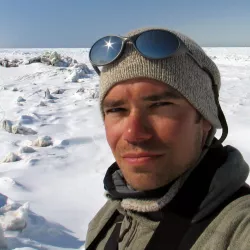Matthew Druckenmiller
Research Scientist III
About Matthew
Matthew Druckenmiller is a research scientist at NSIDC. Since 2006, he has worked within the coastal regions of Arctic Alaska, investigating the connections between changing sea ice conditions and marine mammal habitat, and local Indigenous community use of sea ice for hunting and travel. Currently, he serves as director of the Navigating the New Arctic Community Office (NNA-CO) and co-leads the Exchange for Local Observations and Knowledge of the Arctic (ELOKA). Druckenmiller also serves as the Lead US Delegate to the International Arctic Science Committee (IASC), an editor for the Arctic Report Card, and an editor for the Arctic Chapter within the annual Bulletin of the American Meteorological Society (BAMS) State of the Climate Report. Previously, he has served as a Science Policy Fellow at the National Academies’ Polar Research Board (2005), a project manager at the Arctic Research Consortium of the United States (2006), and a AAAS Science Policy Fellow at the U.S. Agency for International Development (2013 to 2015).
Specialties
Current Research
Navigating the New Arctic Community Office: Through the Navigating the New Arctic Community Office (NNA-CO), Druckenmiller works with a team of researchers and outreach and engagement experts to build awareness, partnerships, and resources for collaboration and equitable knowledge generation within Arctic research. The NNA-CO increases recognition of Indigenous knowledge and data sovereignty; promotes inclusive and collaborative research design and implementation; and coordinates effective knowledge dissemination, education, and outreach. The office builds capacity in early-career researchers and provides unique opportunities to inspire and engage a wide audience toward a more holistic understanding of the Arctic—its natural environment, built environment, and diverse cultures and communities.
Exchange for Local Observations and Knowledge of the Arctic: Through the Exchange for Local Observations and Knowledge of the Arctic (ELOKA), Druckenmiller supports collaboration between resident Arctic experts and visiting researchers to facilitate the collection, preservation, exchange, and use of local observations and Indigenous knowledge of the Arctic. ELOKA provides data management and user support to Indigenous communities to ensure their data and knowledge are managed, visualized, and shared in an ethical manner to work toward information and data sovereignty for Arctic residents.
Arctic Rain on Snow Study: Druckenmiller is a co-investigator of the Arctic Rain on Snow Study (AROSS), which seeks to better observe and understand Rain on Snow (ROS) events across the Arctic. The project is developing a database of all known ROS events since 1979, and incorporating data from surface observations, satellite, and output from modeling. AROSS gathers information on where and how these ROS and melt-refreeze events occur, noting their severity, frequency, and impacts. Detailed and comprehensive data can assist Arctic peoples and decision makers in mitigating the challenges that often accompany ROS events. AROSS is a collaboration between NSIDC, the Cooperative Institute for Research in Environmental Sciences, the University of Colorado Boulder, the University of Winnipeg, the Alaska Pacific University, and the University of Lapland.
